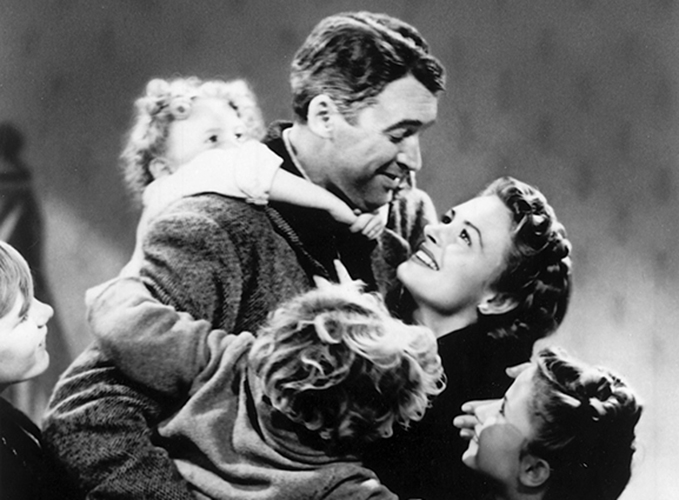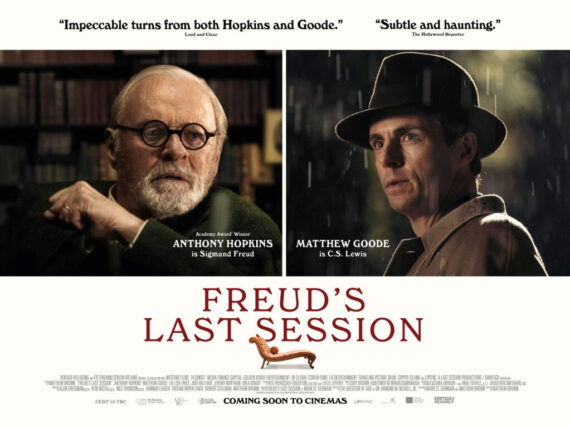Regular blog contributor Helen Tope previews It’s a Wonderful Life, her favourite film! This beloved Christmas classic is showing in our cinema from Thursday 12 to Thursday 19 December.
A perennial classic, Frank Capra’s It’s a Wonderful Life is a film that has become a victim of its own success. After being shoehorned into television schedules since its release in 1946, It’s a Wonderful Life is one of those films that exists in the memory, not as a whole narrative, but through a series of moments. George Bailey, running through a snowy Bedford Falls, is not only peak festive meme, it has become a byword for Christmas cheer. As Bailey runs through his town, with a renewed zest for life, we cannot help but feel a little better about our lot.
But It’s a Wonderful Life goes beyond the superficial expression of joy. James Stewart had to be talked into the lead role by co-star Lionel Barrymore. Changed by his experiences during the Second World War, Stewart did not feel up to the role of George Bailey, small town hero and eternal optimist.
What director Frank Capra allowed Stewart to do instead was dig deeper. Bailey is a character who faces the extinction of everything he knows. The film is not just a retelling of Dickens’ Christmas Carol, Capra dares to explore what the novelist left unwritten. In this story, Scrooge – the town’s richest man – is unsaveable. Mr Potter (played by Barrymore) is a money-grubbing misanthrope. Selling the townspeople slums at punishing prices, Potter has his eye on the bigger picture. Becoming chairman of the local bank, his influence is spreading.
Our hopes for salvation turn to George Bailey. A young man with dreams of college and travelling the world, Bailey has to stay home to oversee his father’s Building and Loan Company, working with his loyal but absent-minded Uncle Billy. A co-operative that builds good homes for ordinary people, the Baileys are at the heart of Bedford Falls. George Bailey gives his carefully saved college money to his younger brother Harry. Having saved Harry from drowning as a boy, the significance of the gesture is not lost on either brother.
Small town life isn’t what George had imagined for himself, but he makes a good try of it. Marrying smart and resourceful Mary Hatch (Donna Reed), they begin renovating an old house. Children come next, and Bailey has no choice but to shelve whatever ambition he had.
We learn that Bailey will soon reach a point where he considers taking his own life. Capra takes us into the heavens, where the celestial bodies gather to discuss Bailey’s fate. It is decided he needs a guardian angel. Clarence (a wonderful Henry Travers) is sent down to Earth to persuade George Bailey to live.
Capra shows us – and Clarence – the past and present of Bailey’s life. The young George, working at the local pharmacy, saves the pharmacist from making a catastrophic mistake when he accidentally boxes up the wrong pills for a sick child. Mr Gower (played by H.B Warner) slaps Bailey on his failure to deliver the pills, but as Bailey explains, Gower realises the narrow miss that would have ruined him.
We now see George Bailey, in charge of the Building and Loan, turning down a lucrative job offer from Potter. Not used to being turned down, Potter spots an opportunity for sabotage, when Uncle Billy misplaces an envelope containing $8,000 at the bank.
The loss is disastrously timed. Not only is the Building and Loan Company undergoing an audit, but Harry Bailey is returning home from the Second World War, a decorated fighter pilot responsible for saving hundreds of lives. George and Billy scramble around, trying to find the cash, only too aware of what is at stake.
Desperate and panicked, Bailey returns home and breaks down in front of his startled family. Fleeing the house, he heads to the local bar. George is now frantic with the possibility of what lies before him. Leaving the bar and walking onto a bridge, he looks at the river below. As he contemplates jumping, Clarence appears and plunges head-first into the water. George dives in to save him.
As they dry off, Clarence tries to explain why he is here. Bailey, still filled with the horror of bankruptcy and jail, refuses to listen. He mutters that it would have been better if he had never been born. Clarence takes up the challenge, becoming the Ghost of Christmas Yet to Come.
What Capra delivers is as chilling as anything Dickens dreamt, as George Bailey descends into a nightmare of his own making. He is a stranger to his friends, his family. His children no longer exist. Bedford Falls is now named Pottersville; a town filled with people living on the edge of poverty, seeking refuge in drink, and brawling in the streets.
On viewing the whole film, it is Capra’s politics that jump out at you: open-hearted and generous, this is small-town America painted not with a superficial gloss, but with great attention to detail. Bedford Falls is a town that thrives because it has turned its back on Potter’s extortionate rents, choosing instead to invest in a better future for itself. Potter’s attempt to shape the town in his own image continues to fail not only because Bailey exists, but because of what he represents. A kindness and sympathy – one of George’s customers admits that he was allowed to keep his home even when he became unemployed – the Bailey name is synonymous with a spirit of giving that lifts not only the individual, but the whole town. As Bailey reminds Potter, the opportunity to own their home is the very least the townspeople deserve.
The Pottersville scenes, with violence, sleazy clubs and hard liquour, is not so much a flip side of Bedford Falls, but an indication of what is lying beneath the surface. In this alternate reality, the cruelty meted out to a destitute Mr Gower feels all too familiar, even to modern audiences. Capra’s small-town portrait has all the eccentricity and humour you might expect, but he reminds us that circumstances shape people, and they can do so, remarkably quickly.
The switch from small-town charm to a scene of utter desperation is alarming, not least because of James Stewart’s performance. A man shaped by circumstance, George Bailey has learned to put his dreams away, but a resentment still simmers, and emerges the minute he realises that Uncle Billy’s error could cost him everything. Stewart rages at his wife and family – the alarm is palpable, because we feel it too.
As depression takes hold, Stewart takes us to the depths of Bailey’s soul. The unspoken regret, the life that might have been. Stewart illustrates with great poignancy how a person can believe their life has no value. As he sees how life would be different without him, the gap he imagines his small life would leave, becomes a chasm. The impact of the Bailey Company, and George himself, reaches out into every corner of the town. Without Bailey there to object, Potter is free to scoop up every bit of land, every investment opportunity. As Clarence shows George the place where a drowned Harry Bailey is buried, the final piece is slotted into place.
Not a great success on its release, It’s a Wonderful Life is now a festive favourite that rewards its loyal fans. If you’ve had a good year, the film bathes you in its warm, comforting glow. If the year hasn’t treated you so well, George’s bargaining with God resonates right down to the core. Life at least gives you the chance of something better.
It’s a Wonderful Life is sometimes depicted as a sentimental film, but watched, not in fragments, but from start to finish, we go on a journey with George Bailey. From the boy who saves his younger brother from drowning, to the man who puts his dreams on hold to save his father’s company, George Bailey may seem like the selfless hero at first glance, but Stewart does not spare us from Bailey’s bitterness. It explodes across the final act of the film. Stewart understands his character inside out, and gives us a man who is principled and decent, but also morose and self-pitying. It is an important distinction to make – as George Bailey runs through Bedford Falls on Christmas Eve, we need to remind ourselves of what it’s taken to get him to that point.
As the Christmas Carol analogy plays out, It’s a Wonderful Life does more than rehash an old narrative. Yes, it has moments of sentimentality, but it is also a political film – Bedford Falls is a society working not to serve the individual, but aid the many. It is also a film about family – home, work and town. Most importantly, it is a film that gets to the heart of why a life, any life, should matter. As George wonders if the people in his life would be better off without him, we already know the answer. George Bailey’s life is not only wonderful, it is irreplaceable.
Helen Tope









Comments
Comments are closed.